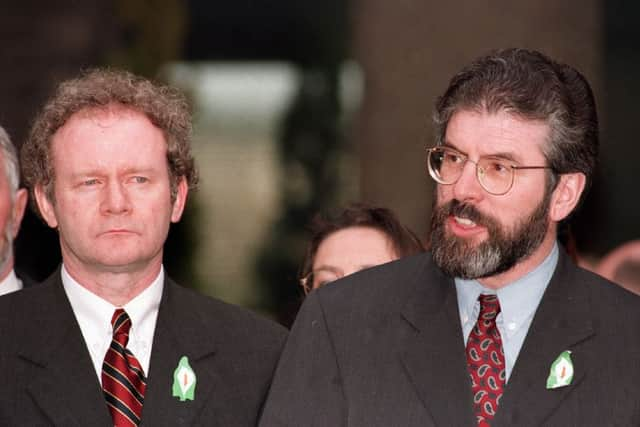Unionists should stop whingeing '“ the '˜rise and rise' of Sinn Fein can be halted


Our conversation had started with the likelihood of a border poll, leading into a broader chat about what he termed the ‘rise and rise’ of Sinn Fein. He couldn’t understand how a party that had “justified and celebrated IRA terrorism was a whisker away from being the largest party in the Assembly”.
Nor could he understand – and I’ve heard the same thing across unionism – why so many “decent, democratic nationalists who used to vote SDLP now vote for terrorist apologists and Sinn Fein candidates who were IRA members”.
Advertisement
Hide AdAdvertisement
Hide AdIn some ways the ‘rise and rise’ of Sinn Fein isn’t all that surprising. As far back as July 1972, when Gerry Adams and Martin McGuinness met representatives of the UK government for secret talks in London (after which ‘back channels’ were kept open), it was clear that the party was interested in a political route. Just three months later the government produced an official discussion paper on NI’s future which included mandatory power-sharing and an ‘Irish dimension’.


My own suspicion is that it was also around that time that British policy became one of delivering a solution into which the IRA/SF would buy; rather than a purely military, back-the-Union-at-all-costs solution. There’s no evidence to suggest that Sinn Fein in government was their expected, let alone preferred outcome; although that became inevitable in November 2003 when Sinn Fein and the DUP overtook the UUP and SDLP in the Assembly election.
Anyway, it was soon obvious to Sinn Fein that the IRA would not succeed in bombing Northern Ireland out of the United Kingdom. They were also canny enough to recognise that the mixture of anger and grief accompanying the 1981 hunger strike would be better channelled into election/political/propaganda campaigns than a stepping-up of the ‘armed struggle,’ so the shift to the ‘armalite, ballot box’ strategy at the end of 1981 was no great surprise, either.
Their first election – the June 1982 Assembly election – was a huge success for them, winning 10% of the vote (a few thousand more than Alliance and 8% less than the SDLP). In the general election a year later, they pushed their vote up to 13.4% and Gerry Adams captured West Belfast from the SDLP’s Joe Hendron. Yet in the 14-year period between 1982 and the Forum elections in 1996 (when the IRA’s 1994 ceasefire had ended) Sinn Fein’s average share of the vote was 11.5% to the SDLP’s 24%.
Advertisement
Hide AdAdvertisement
Hide AdOn statistics alone it didn’t look as though the decision to prioritise elections/politics was going to reap the crucial dividends for Sinn Fein. They were still only fourth of the big five parties and didn’t look as though they could close the gap with the SDLP. Then, something odd happened. In the 1997 general and local government elections Sinn Fein pushed up to almost 17% (ahead of the DUP); and while the SDLP held their 24% at the general election, they slipped to 20% in the local government election. Then, in the first election to the new Assembly, in June 1998, Sinn Fein moved to almost 18% – just 4% and six seats behind the SDLP. The rest, as they say, is history.
Whatever anyone thinks of Gerry Adams and Martin McGuinness the fact remains that it was mostly their efforts which took Sinn Fein from the margins to the centre. From 1972 onwards they knew when to recognise the opportunity and seize the moment. If that meant U-turns on policy then so be it; although those U-turns were always done after intense internal discussions and negotiations.
It helped, of course, that they were both there from the beginning; earning the trust of both the IRA and Sinn Fein’s grassroots. Crucially, their personal double act reassured London, Dublin and Washington that if they said something could be delivered, then it would be delivered.
But that both men could, willingly and easily, shift from endorsing violence to endorsing democracy shouldn’t be forgotten. When, for example, they believed that the 1994 ceasefire hadn’t delivered as much as they thought it should have delivered, there was no particular evidence of regret or undue concern when it ended with a massive bomb at Canary Wharf on February 9 1996, with the death of two men and the injuring of more than 100 people.
Advertisement
Hide AdAdvertisement
Hide AdA year later, after it had been revealed that Sinn Fein had been in contact with the new government and Tony Blair confirmed that Sinn Fein could enter talks before decommissioning had begun, the IRA announced ‘a complete cessation of military operations’. The tap turned on and off as required.
Yet, when all is said and done, Sinn Fein still hasn’t delivered Irish unity. And for all their talk about unity being just a matter of time, that time may not be soon – if at all. They require solid evidence that a border poll would produce a majority for Irish unity. They don’t have that evidence. And if the border poll question is built around a choice between NI remaining in the Union or joining a united Ireland, then there’s a requirement for the Irish government to take part in the debate and set out a possible template for unity. There is, as yet, no evidence of that, either.
So, the continuing ‘rise and rise’ of Sinn Fein is not unstoppable. Irish unity is not inevitable. That won’t, of course, stop Sinn Fein’s relentless propaganda and repositioning. And nor should it stop unionism from relentless deconstruction of Sinn Fein’s arguments; or of kick-starting their own major, thought-through, broad-based, pro-Union campaign. Put bluntly, stop whingeing about Sinn Fein and, instead, counter their various strategies, policies and narratives.